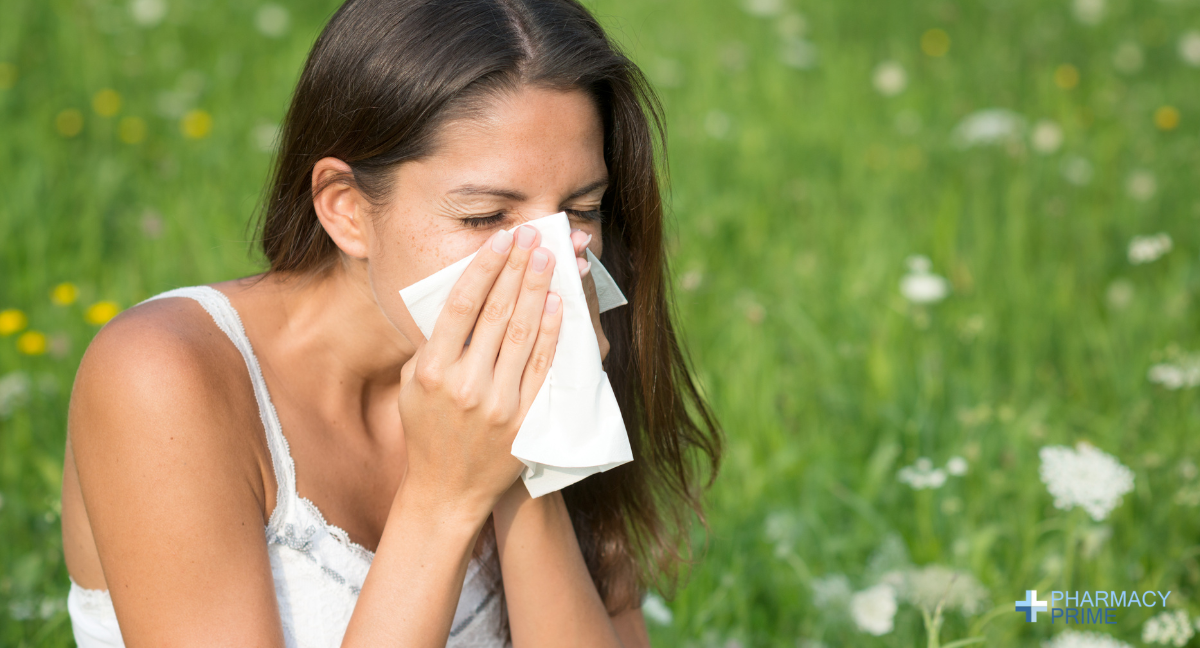Introduction
In this blog, we’ll look at what allergies are and what causes them, different symptoms of an allergic reaction, how to treat allergies, and antihistamines.
What is an allergy?
An allergy is your body reacting to something like pollen, dust, or animal fur.
Many people, including children, experience seasonal allergies and hay fever every year, while others have recurring allergies regardless of the season. In fact, approximately 44% of adults and 50% of children in the UK suffer from at least one allergy. Symptoms can range from mild to severe and may differ between individuals.
What causes allergies?
Something that causes an allergic reaction is called an allergen.
Common allergens include:
- Pollen from trees, grass, and other plants (hay fever)
- Dust mites
- Foods such as peanuts, milk, or eggs
- Animals, especially common pets like dogs or cats
- Insect stings such as those from bees and wasps
- Certain medicines
Some of these allergens, like pollen, are more common at different times of the year, such as in the spring and summer, and contribute to what are considered seasonal allergies, which affect around 16 million people in the UK.
What are the symptoms of an allergic reaction?
Symptoms can vary, but often include:
- Runny or congested nose
- Sneezing
- Coughing, wheezing, or breathlessness
- Pain or tenderness around the cheeks, eyes, or forehead
- Itchy or watery eyes
- Itchy skin or raised rash (hives)
- Diarrhoea
- Feeling or being sick
- Swollen eyes, mouth, lips, or throat
|
Serious allergic reactions can be life threatening. Call 999 immediately if: If the person experiencing the allergic reaction has an adrenaline auto-injector (such as an EpiPen), it should be used immediately. |
How can I treat allergies?
For common and non-serious allergies, there are many medicines available in different forms, such as tablets, nasal sprays, eye drops, and syrups, to help prevent and ease symptoms.
Some common brands you may recognise include Clarityn, Piriton, and Benadryl. Nasal sprays such as Beconase and Sterimar and eye drops like Optrex and Murine provide targeted relief, while antihistamines such as Cetirizine and Loratadine can also help to relieve allergy symptoms more generally.
If you and your family experience seasonal allergies, it is possible to purchase value packs of medicines to ensure you all feel your best until the allergy season has passed. Pharmacy Prime offers 6-month bundles of Loratadine Hay Fever Relief Tablets, Numark Allergy Relief Tablets, and Cetirizine Antihistamine Tablets.
Some medicines are specifically formulated for children, such as Piriton syrup (only for children aged 1 year and older), Bells Children’s Allergy Relief (for those aged 2 years or older), and Becodefence Kids Allergy Defense Nasal Spray (for children aged between 6-12 years).
You can view our complete Allergies & Hay Fever collection here.
What are antihistamines and how do they work?
Many medicines that help with allergies are antihistamines. Antihistamines work by blocking the effects of the substance in your body called histamine.
Histamine is released when your body detects something harmful, causing blood vessels to expand and the skin to swell. However, in people with allergies, the body mistakes something harmless–such as pollen, animal dander, or house dust–for a danger and reacts by producing histamine, which causes the allergic reaction. Antihistamines can help stop this from happening when taken before you come into contact with an allergen, or can help reduce the severity of the symptoms if you take them after.
Note that some antihistamines can make you drowsy, so you should avoid driving, operating machinery, and similar if you experience this side effect, and you should always read the informational leaflet that comes with your medicine prior to using it.
In summary
Allergies are your body’s reaction to different things that you may encounter, such as pollen, animal dander, and dust mites.
While symptoms and their severity can vary, many people experience sneezing, runny noses, coughing, and itchy and watery eyes. Severe allergic reactions, often characterised by becoming short of breath and the mouth, tongue, or face swelling, necessitate calling 999 immediately.
There are many products available to help prevent and manage allergies, including antihistamines, which work by blocking histamine (what your body produces when it comes into contact with something that normally causes your allergies).

